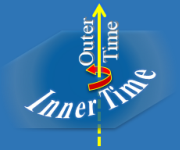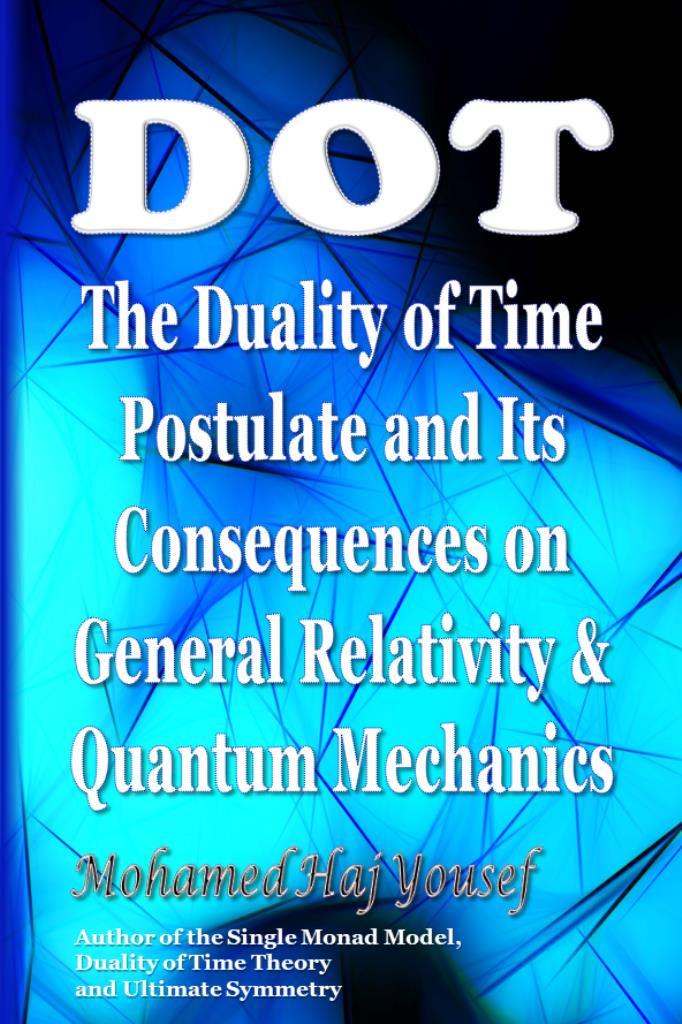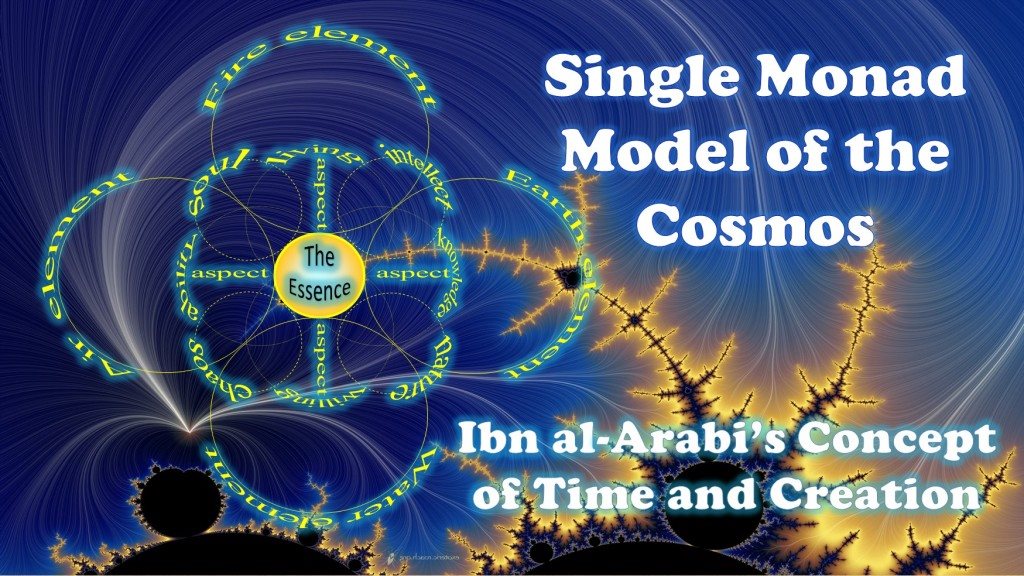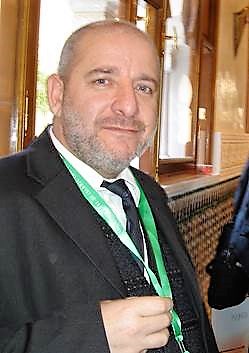Most of these introductory articles are exracted from Volume I of the Single Monad Model of the Cosmos: Ibn al-Arabi's View of Time and Creation... more on this can be found here.
Causality and Induction
Causality and Induction:
As Ibn al-Arabi often pointed out in his analyses of our unconscious reliance on our 'habitual' forms of perception (‘ada), the main obstacle that prevents us from discovering the reality of creation is our deep trust in causality and induction. It is true that we live by causes and results, but indeed this is only a limited and superficial perspective with regard to the underlying realities. The fact of the matter is that what we refer to as a 'cause' and 'result' - i.e., what Ibn al-Arabi normally calls the asbab (s. sabab), or intermediate or 'apparent' causes - are chronologically arranged, but ontologically unrelated. This is quite evident in terms of the re-creation principle discussed above, but Ibn al-Arabi also clearly declares that "Allah creates things 'next to' (‘inda) the causes and not 'through' (bi) them" [II.204.13, Tadbirat: 312]. As we've already seen above and in sections II.6 that motion is only a new creation in a different place, so there is no deeper, inherent ontological relation between the two created states before and after motion.
Also - as a result of the readily observed systematic causes and effects - we normally rely upon induction in drawing most of our conclusions about causality. But in chapter 56 of the Futuhat, Ibn al-Arabi argues that 'in reality induction (al-istiqra’) does not give any (true divine) knowledge' [I.285.3]. The reason why he concludes that is simply because nothing is ever truly repeated [I.285.28], as we have also shown above in discussing the re-creation principle. Induction ultimately means that we expect something to occur in a specific definitive way, based on previous observations of similar circumstances and regularities.
For these reasons, according to Ibn al-Arabi, the basic observational and logical principles that the scientists and philosophers of his time relied upon in seeking the truth are indeed not firm, so that their practical success deceives us with regard to their limitations and restricted spheres of application. For this reason Ibn al-Arabi's answer to Ibn Rushd (see section V.1) was first 'yes', but then he immediately added again 'no', to highlight the limitations of the philosophers' methods, in comparison to his own reliance on divine inspiration and 'unveiling'.
Ibn al-Arabi, however, does not deny the phenomenological relevance of the apparent, intermediate 'causes' (asbab): on the contrary he affirms that they are intentionally established by Allah, so they are unavoidable [II.653.11], and we must rely on such causes to reach our goals. So those observable secondary/apparent causes may not be removed:
And we already informed you that apparent-causes (asbab) are divine veils, so that removing them is not possible except through them (i.e., by other secondary causes). So the very removing of causes is in fact fixing them; and the reality of abolishing them is (actually) affirming them. [II.553.31; see also I.382.26, III.340.9, IV.275.23, and III.235.28]
So since they are veils, we have to look through them to see the Real, Who continually creates the causes and the results and arranges them in this specific 'habitual' dependency. As Ibn al-Arabi explains, Allah creates simply by the Command 'Be', and therefore He does not need the secondary causes; but He establishes these apparent causes for us to unveil them [II.413.35], though we would never be able to unveil the causes completely and permanently, especially since our own unenlightened mentality itself is the main veil [II.553.6].
In the short chapter 252 of the Futuhat Ibn al-Arabi analyses the known spiritual state of 'abolishment' (al-mahw), in which the spiritually realized person is freed from the unconscious limitations of habitual perception (‘ada), so that the rule of apparent 'causality' is removed for him and he can directly perceive the universal reality of ever-renewed creation. There he says:
For the person in the state of 'abolishment' (of the 'habitual' perception of causality), relying on causes is removed, but not the causes. For Allah never deactivates the rule of (divine) wisdom with regard to the (created) things, and the apparent-causes are (like all other creations) divine 'veils' established.
The greatest of those veils may not be removed, which is your own individual-self (‘ayn: also, 'eye'). For your individual-self is also the cause (still sabab) behind the existence of (the possibility of our) knowing and recognising Allah - since knowing Allah may not come to exist except through your individual self!
So it is not possible for you (i.e., the veil of your ego-self) to be 'removed' with Allah's wanting to be known (by you). So He abolishes you from (witnessing) yourself, so you no longer stop with (witnessing) yourself, even though your individual-self still exists, since the manifestation (of His transforming) influence is from Him. This is just as (in the famous incident at Badr alluded to in verse 8:17) He 'abolished' (the normal causal role of) the Messenger of Allah, may Allah have peace and mercy upon him, with regard to his throwing, despite the (actual) existence of throwing by Him: so He said 'and you threw not', so he abolished him; 'when you threw', so He affirmed the apparent-cause; 'but Allah threw' (8:17), and He only threw by the hand of the Messenger of Allah, may Allah have peace and mercy upon him.
[II.553.5]
The apparent-causes are indeed manifestations of the influences of His Names, which is why we see the effects following from those causes, but indeed the effect - like all of creation - is also only (ultimately) caused by Allah Himself. This means, as Ibn al-Arabi affirms, that the names of causes are in fact Names of God:
Then you have to know that the contingent things (creatures) are by essence in need (of being given existence), so that need always accompanies them because their essence (as contingent, 'needy' things) is forever. So He established for them the apparent-causes (asbab) through the presence of which they receive what they need. So they are in need of the apparent-causes, therefore Allah made the individual-reality (‘ayn) of those apparent-causes Names for Him. So the names of the causes are from (the influence of) His Names, may He be Exalted, so that (the contingent thing) should only need Him, because this is the correct knowledge (of the nature of things).
So there is no difference, for the people of unveiling, between the names that are said to be the Names of Allah according to (religious) custom and the revelation, and the names of the apparent-causes, so far as their (all) being Names of Allah, because He said: you all are in need of Allah (35:15). For we see in reality the need for the apparent-causes, so the names of the apparent-causes must be Names of Allah, the Exalted. So we call out in prayer to those names (of the apparent-causes) by (the needfulness of our actual) state, not through outward words (of prayer).
Thus when we are touched by hunger we rush to seek the food that may remove the pain of hunger. So we are in need of it, and it has no need of us - although we (in fact) are only in need of Allah. So that (food) is one of His Names: I mean the form of this food descends to take the place of the spoken or written word of the (corresponding) divine Name. That is why He ordered to be thankful to the apparent-causes (31:14), because He ordered us to be thankful to Him - that is, to thank Him through them.
[III.208.7]
But seeing through the apparent causes (to the One real Cause/Creator) is not easy, and ultimately the meditations and path of ascension of the spiritual seeker are all directed toward that. At the end of this path, the seeker will see only the Image of the Real (rather than his ego-self), and that is why: 'whoever knows himself knows his Lord'.
However it is very important to notice that at the highest steps of this ascension, as the seeker advances, he gradually loses the awareness of his limited physical composition, so that what remains at the end is the pure receptivity of 'hearing', just as that 'hearing' (sama‘, or sam‘) was the first condition of all things created. Thus Ibn al-Arabi says:
He said: and Our word unto a thing, when We intend it, is only that We say unto it 'Be!', and it is (16:40), but He deafened us from perceiving this word except by the way of faith, and He blinded us from seeing His intention (tawajjuh) on creating the things, by the apparent-causes that He established. thus He sends the rain down, and it falls; and He makes fertile the land, the seeds sprout; then He sends out the sunlight, so the plants rise, and (the seeds) harvested, ground up, kneaded, baked and chewed by the teeth; then they were swallowed, ripened in the stomach, taken by the liver and made into blood, sent into the vessels and distributed over the body until the (life-giving) vapour rises out of them, so the life of this body is for the sake of that breath (that we breathe).
So these are the primary apparent-causes (for life), along with (His) moving the celestial spheres and the motions of their planets, casting the rays on the places (illuminated by) the (celestial) lights - (all that) under the supervision of the Universal Soul, with Allah's permission, and the support of the (First) Intellect for (the Universal Soul). All these are veils, established as the fundamental (apparent-causes), in addition to the other, lesser apparent-causes. So the (human receptivity or) 'hearing' needs to break through all those veils until it hears the (creative divine) word 'Be!'. Therefore He created in the person of faith the power of faith, so that it flows into his hearing until he realizes the word 'Be', and it flows into his sight until he witnesses the One Who gives existence to the apparent-causes. And He has done all that through the 'Breath of the All-Merciful'….
[II.413.35]
So - despite their ultimately being ontologically unrelated - one cannot deny the effect of the apparent-causes. Therefore, we have to look at other prospects for redefining the principle of causality. We have seen before (section III.5 [The Seventh 'Day of Rest' (al-sabt, Saturday)]) that Ibn al-Arabi affirmed that after all the forms in the world have been created in the six Days from Sunday to Friday (which is space), nothing remained to be created on Saturday, that is the 'Day of eternity' or the instant of time that we live in at each now. What remains is only continual creative changing the states of things 'from (one) state to (another) state and from (one) station to (another) station' [I.61.14]. Therefore the system of the world, as a still picture created in the Week, is a 'closed system' in the meaning that all changes in it are necessarily internal changes.
Therefore, whatever change happens in one part of this world will require another change in other part(s), so that the total state does not change. This last statement seems to articulate a new, more adequate form of the causality principle, and indeed this is exactly one of the principles of Quantum Mechanics which has proved to be successful over the last century (see section I.3). This is in fact a very important conclusion and it could be the key to a new understanding of the reality of motion. This also might explain the types of what science tends to view as inexplicable 'para-psychological' phenomena, such as the telekinetic effects and telepathy which are widely known as karamat (acts of grace). The world in all its directions of space and time, past and future, here and there, is already encoded (via the divine Foreknowledge) in the Single Monad, so whoever has any access to that Source should be able to predict what is in or affects other parts of the world. If we want to study this issue further we have to look at the divine Attributes of Power and Will, and their image in the human being and the world, and relate them to time and space, as Ibn al-Arabi discussed at the end of his short treatise al-Durrat al-Bayda.
... Space Transcendence Read this short concise exploration of the Duality of Time Postulate: DoT: The Duality of Time Postulate and Its Consequences on General Relativity and Quantum Mechanics ...
... g the truth are indeed not firm, so that their practical success deceives us with regard to their limitations and restricted spheres of application. For this reason Ibn al-Arabi's answer to Ibn Rushd (see section V.1) was first 'yes', but then he immediately added again 'no', to highlight ...
... a result of the readily observed systematic causes and effects - we normally rely upon induction in drawing most of our conclusions about causality. But in chapter 56 of the Futuhat, Ibn al-Arabi argues that 'in reality induction (al-istiqra’) does not give any (true divine) knowledge' [ ...
... we have to look at the divine Attributes of Power and Will, and their image in the human being and the world, and relate them to time and space, as Ibn al-Arabi discussed at the end of his SHORT TREATISE al-Durrat al-Bayda. Read Other Books: The Single Monad Model of the Cosmos: Ibn Arabi ...
... causality principle, and indeed this is exactly one of the principles of Quantum Mechanics which has proved to be successful over the last century (see section I.3). This is in fact a very IMPORTANT CONCLUSION and it could be the key to a new understanding of the reality of motion. This a ...
... ually realized person is freed from the unconscious limitations of habitual perception (‘ada), so that the rule of apparent 'causality' is removed for him and he can directly perceive the UNIVERSAL REALITY of ever-renewed creation. There he says: For the person in the state of 'abolishme ...
... giving) vapour rises out of them, so the life of this body is for the sake of that breath (that we breathe). So these are the primary apparent-causes (for life), along with (His) moving the CELESTIAL SPHERES and the motions of their planets, casting the rays on the places (illuminated by) ...
... etic effects and telepathy which are widely known as karamat (acts of grace). The world in all its directions of space and time, past and future, here and there, is already encoded (via the divine Foreknowledge) in the Single Monad, so whoever has any access to that Source should be able t ...
... ed as the fundamental (apparent-causes), in addition to the other, lesser apparent-causes. So the (human receptivity or) 'hearing' needs to break through all those veils until it hears the ( CREATIVE DIVINE ) word 'Be!'. Therefore He created in the person of faith the power of faith, so that ...
... uses completely and permanently, especially since our own unenlightened mentality itself is the main veil [II.553.6]. In the short chapter 252 of the Futuhat Ibn al-Arabi analyses the known SPIRITUAL STATE of 'abolishment' (al-mahw), in which the spiritually realized person is freed from t ...
... etic effects and telepathy which are widely known as karamat (acts of grace). The world in all its directions of space and time, past and future, here and there, is already encoded (via the divine Foreknowledge) in the Single Monad, so whoever has any access to that Source should be able t ...
... seems to articulate a new, more adequate form of the causality principle, and indeed this is exactly one of the principles of Quantum Mechanics which has proved to be successful over the la ST CENTURY (see section I.3). This is in fact a very important conclusion and it could be the key to ...














